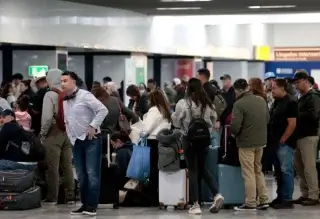read also
 Inflation in Romania Slows to 9.6% but Remains Above Forecast
Inflation in Romania Slows to 9.6% but Remains Above Forecast
 Riots in Mexico Disrupt Air Links to Resort Destinations
Riots in Mexico Disrupt Air Links to Resort Destinations
 UK House Prices Stabilise After 2025 Slowdown
UK House Prices Stabilise After 2025 Slowdown
 Israel Housing Market Eyes a Reset in 2026
Israel Housing Market Eyes a Reset in 2026
 Real Estate Investment Declines in Southeast Europe in 2025
Real Estate Investment Declines in Southeast Europe in 2025
 Asia Becomes the Engine of Global Aviation
Asia Becomes the Engine of Global Aviation
Spain Overhauls Immigration Rules to Legalize 300,000 Migrants Annually — NGOs Raise Alarms

Madrid, May 20, 2025 — The Spanish government has enacted major reforms to its Immigration Regulations, aiming to streamline residence pathways for non-EU nationals and regularize up to 300,000 undocumented migrants each year. But while the reform promises flexibility, migrant rights organizations are sounding the alarm over potential blind spots in protection.
New Rules Aim for Simplification & Efficiency
Effective May 20, the reforms aim to simplify administrative procedures, cut excessive bureaucracy, and reduce duplicate document requests. Spain’s Minister of Inclusion, Social Security and Migration, Elma Saiz, said the goal is to reduce processing delays and make it easier for migrants to understand their rights and available legal channels.
The law now clarifies permit types and streamlines the modification of legal status for migrant workers and their families.
Five New Settlement Routes for Migrants
The updated regulation recognizes five official settlement pathways:
Social-based settlement
Socio-educational settlement
Work-related settlement
Family-based settlement
Second-chance regularization
One of the most impactful changes: the minimum period of residence has been lowered from three to two years, and migrants can now work as employees or be self-employed from the start.
The reform also introduces a new combined residence-work permit, streamlining hiring processes for foreign workers.
New Rules for Students
International students in Spain will now be allowed to:
Work up to 30 hours per week, even if the job is not related to their degree;
Hold a residence permit valid for the full duration of their academic program.
NGOs Warn of Gaps in Asylum Protections
Despite the government’s optimistic framing, NGOs such as Caritas, CEAR, and Jesuit Migrant Service have filed legal appeals to the Supreme Court. Their core concern: the reforms don’t allow time spent waiting for asylum decisions to count toward residence requirements.
This means that rejected asylum seekers could be excluded from regularization pathways, even if they’ve been in Spain for years.
These groups warn the reform could push more people into irregular status, undermining integration efforts.
“The system may become more efficient on paper, but it risks leaving thousands of vulnerable people behind,” said a spokesperson from CEAR.
As Spain pushes ahead with its immigration modernization plan, the balance between administrative efficiency and human rights will remain at the center of the national debate.
Подсказки: Spain, immigration, migration policy, residence permit, asylum, NGOs, Caritas, CEAR, migrant workers


